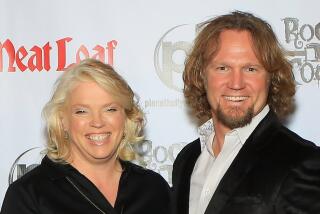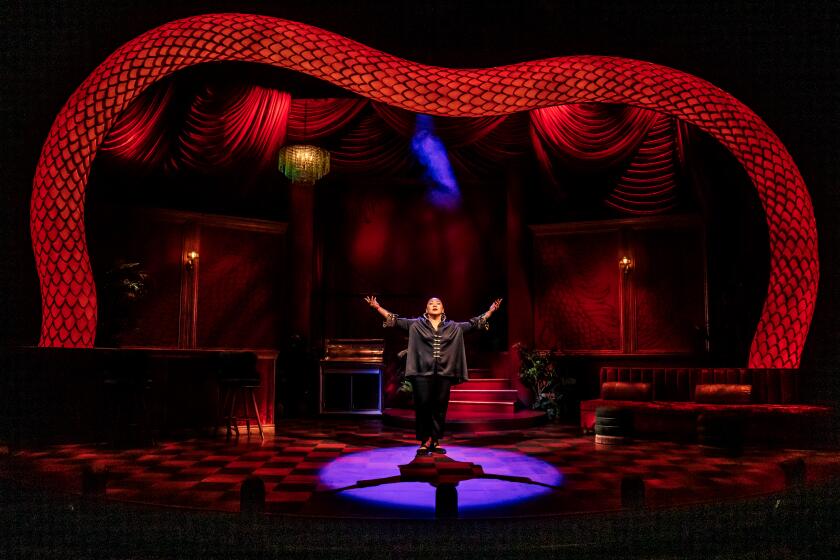Screenwriter and novelist Peter Lefcourt has never written himself into a corner
Hollywood has had writer Peter Lefcourt to kick around for four decades now, and it doesn’t look like it’s letting up any time soon. Highs have included an Emmy for “Cagney & Lacey” and his latest gig as co-executive producer on the current season of “Desperate Housewives.”
Lows have encompassed a jobless period after having been deemed “difficult,” just about the worst label a writer can get. It’s no wonder that the author, screenwriter and playwright holds his highest praise for the stage.
FOR THE RECORD:
Peter Lefcourt: An article about writer Peter Lefcourt in Friday’s Calendar identified Barney Rosenzweig as the creator of the TV series “Cagney & Lacey.” Rosenzweig was the executive producer; the show was created by Barbara Corday and Barbara Avedon. —
“Theater is the dessert of life,” he declares. “You can’t be fired off your play.”
Still, Lefcourt has managed to not just survive the industry but to thrive in it. He’s turned his darkest moments into even darker hits. Over coffee at a Studio City restaurant, Lefcourt recounts his journey with the ease of a longtime storyteller.
He was born and raised in Queens, N.Y., and lived for a while on the Lower East Side of Manhattan. In 1972, he was “a hippie driving a cab,” he recounts, “the best apprenticeship for a writer. I spent virtually every night listening to little one-act plays.”
A relative suggested he try writing for television. “I had already written a very bad porno movie script,” he says, laughing. “I figured there’s a good story here, I’ll just take the sex out.” He sent it off, and two months later a producer flew him out to Los Angeles. “I met with him for a week, did rewrites, got an agent, picked out the Porsche, the whole thing.”
Returning home to pack, he learned that the project was dead. But he moved out anyway.
Within a few years, he landed a job on “Eight Is Enough.” That started a decade of work on such shows as “Scarecrow and Mrs. King” and “Remington Steele.” “I got married, had a kid, bought a house, the whole Hollywood dream,” he recalls. The high point was landing on “Cagney & Lacey.” The show was a breakthrough, portraying women in realistic roles as they juggled work and family life. And it was a breakthrough for Lefcourt, earning him that Emmy.
But instead of boosting his career, the Emmy nearly ruined it. “I didn’t show sufficient enthusiasm for people who wanted to help me with my scripts,” he concedes, an art he has since mastered. “At the time I felt, I won an Emmy, who’s telling me how to do this?” By 1989 he couldn’t get a job, having been labeled “difficult” by the industry.
“Cagney” creator Barney Rosensweig still doesn’t buy the label. “He was never difficult to me. You have to understand the source; I was more difficult than anybody. But I’ve never met anybody who didn’t like Peter.”
Art of ‘The Deal’
Nevertheless, Lefcourt decided he’d had a nice run; it was time to move back to New York. But first, “I was going to burn my bridges to the ground and write the darkest, nastiest, most cynical book about Hollywood I could think of,” which became 1991’s “The Deal.” Thanks to the perverse logic of Hollywood, the novel was a cult hit. Suddenly Lefcourt was hot again. Going through a divorce and in need of money, he decided to stick around, and he was soon back to writing movies and pilots.
He also completed his second novel, “The Dreyfus Affair,” a love story between two major league baseball stars. Disney optioned it, then apparently realized what it was about and killed it, optioned it again a few years later, then killed it again. It has been optioned four times since.
“It’s available,” he offers.
In 1992 he was hired to write the teleplay for “The Women of Windsor,” “the 11th Princess Di movie,” he says dryly. For research, he was embedded with paparazzi following Diana, learning more than he ever wanted to know. The show did well, but he thought the bizarre exercise should serve something more. So he wrote “Di and I,” a novel that answers the question: What if Princess Diana fell in love with a callow Jewish screenwriter from Los Angeles? They’d end up running a McDonald’s in Cucamonga, naturally.
The book became a scandal in England. “So that became the story, the British reaction to an American presuming to write a fictional love story with Princess Diana,” he explains. “Entertainment Tonight” had him on. People magazine arranged a photo spread of him with a Diana look-alike.
Was he getting hotter? Well, almost. “I’m doing a book signing on June 19, 1994, at this bookstore on Ventura Boulevard, sitting with a stack of 150 books and a big cutout of me, and nobody walks in the door. Not one person,” he relates. It turns out that O.J. Simpson was riding on the San Diego Freeway in a white Bronco just then. Lefcourt was also bumped from People to make room for O.J. coverage. He turned that experience into his next novel, “Abbreviating Ernie.”
In 2000, Showtime tapped Lefcourt to create a satire of the TV business. He brought on writers Charlie Hauck (“Frasier, “Home Improvement”) and David Shore to work with him on “Beggars and Choosers.” “We didn’t need any technical advice. It was our life,” Lefcourt notes.
Shore, creator of Fox’s “House,” says “Beggars” “may have been the most pleasant job of my life.” He first met Lefcourt on “Due South,” Shore’s first writing gig. “I’d been working there for three months, and Peter came in. After 24 hours he was telling me the lay of the land. He became my rabbi, telling me where things stood, and where I should stand.”
Lefcourt’s career has seen so many ups and downs, it makes sense that he would be drawn to write a play about such upheavals.
“La Ronde de Lunch,” now playing at the Skylight Theatre, takes the central conceit from Arthur Schnitzler’s 1900 play, “La Ronde,” in which couples whirl through 10 sexual entanglements; in Lefcourt’s imagining, sex is replaced with lunch. At a pretentious restaurant, one couple after another -- aging star and producer, producer and studio executive, executive and agent, and so on -- banter over breadsticks to further their careers. “It struck me that in our town, lunch is not a meal,” Lefcourt says. “It’s a war game.”
Writers’ room
The play was first produced in 1992, and he has updated it as needed for successive revivals. His wife, Terri Hanauer, directs this incarnation. (In a neat plot twist, she first fell for him after seeing the 1992 show.)
Lefcourt also just completed a new novel, “An American Family,” about five siblings in a Jewish American family growing up during the turbulent 1960s and ‘70s. “The subject is assimilation,” he says, calling it culturally autobiographical.
Last summer, Marc Cherry, a fan of “Beggars and Choosers,” invited Lefcourt to work on Cherry’s “Desperate Housewives.” Lefcourt has been at it for four months, “in a room with a dozen of the funniest, darkest senses of humor in Hollywood.”
“I was surprised” by Cherry’s offer, Lefcourt says. “I thought that I’d retired, but apparently I hadn’t. I still marvel that I’ve been able to pull this off for 35 years.”
More to Read
The biggest entertainment stories
Get our big stories about Hollywood, film, television, music, arts, culture and more right in your inbox as soon as they publish.
You may occasionally receive promotional content from the Los Angeles Times.










